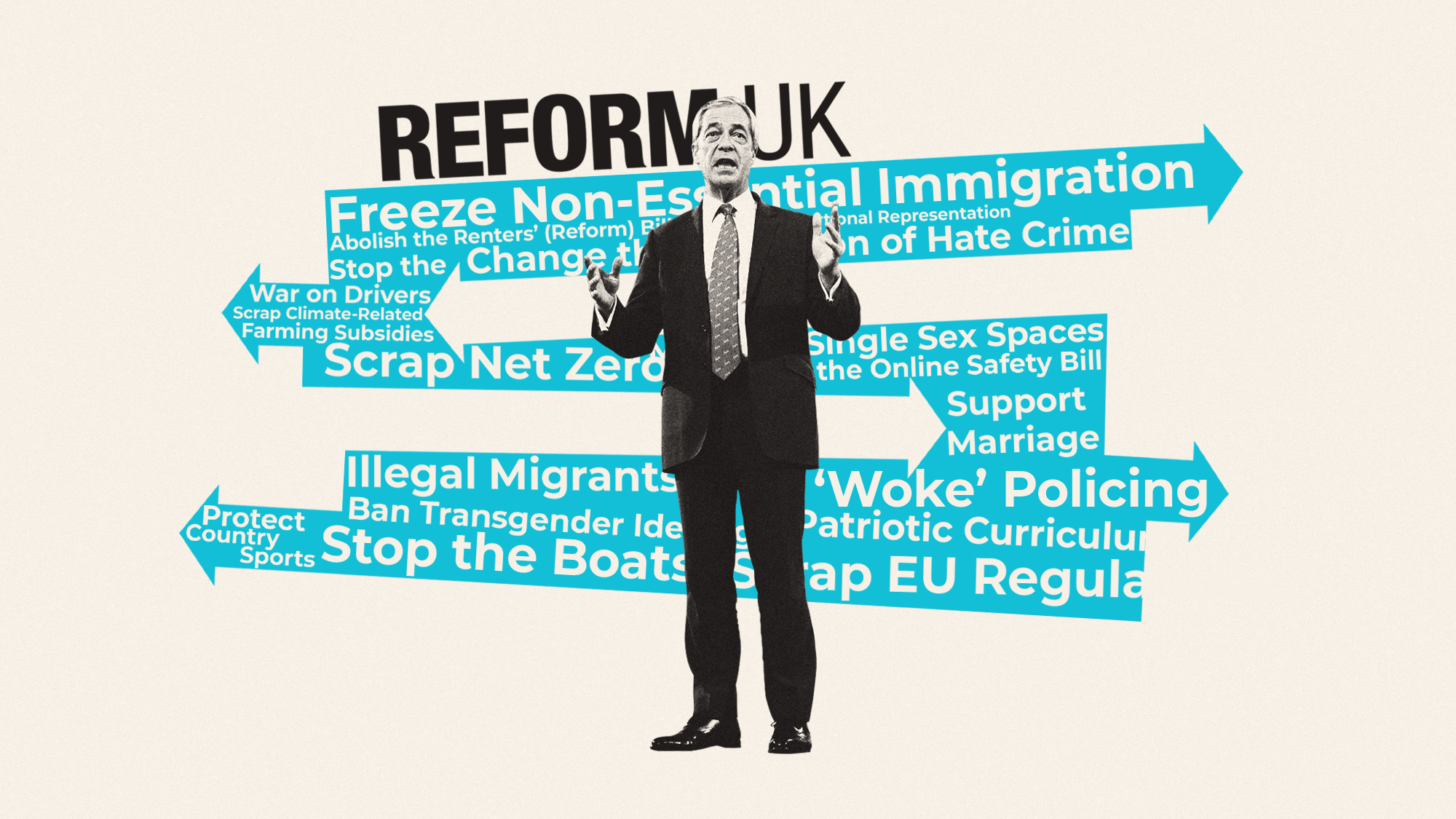What does Reform UK stand for?
Latest party conference more professional than previous Reform outings

A year ago, Reform UK’s conference was “a curiosity on the fringe of British politics”, said Fraser Nelson in The Times. But its gathering last week felt like the “main event”, such is the momentum behind the party. The halls were packed; Heathrow Airport sponsored a corporate lounge; the Institute for Government was hosting seminars.
For £10,000, you could have your company logo on a Reform bus; a £60,000 package included a champagne breakfast with the man who says he’ll be the next prime minister. “Once, a laughable claim. Less so now.”
“Folks, it’s happening,” declared a triumphant Nigel Farage from the stage, speaking in the wake of Angela Rayner’s resignation from the Government. “We are all ships rising on a turquoise tide headed ever closer towards winning the next general election.” The audience believed him.
The Week
Escape your echo chamber. Get the facts behind the news, plus analysis from multiple perspectives.

Sign up for The Week's Free Newsletters
From our morning news briefing to a weekly Good News Newsletter, get the best of The Week delivered directly to your inbox.
From our morning news briefing to a weekly Good News Newsletter, get the best of The Week delivered directly to your inbox.
What is Reform UK?
Founded by Nigel Farage in 2018 as the single-issue Brexit Party, it was rebranded as Reform UK in 2021, following the UK’s formal departure from the EU the previous year.
Initially focused on anti-lockdown messages during the pandemic before pivoting to broader right-wing populist themes, Reform has surged in the polls thanks to its ability to offer an alternative to a Westminster elite who, according to Farage, “speak an entirely different language to those who live in the real world”.
Despite running an at-times chaotic and amateurish ground game, the party still secured millions of votes in last year’s general election. But its real breakthrough came in May’s local elections: it secured two mayoralties, 677 council seats and overall control of 10 councils, not to mention snatching the parliamentary seat of Runcorn and Helsby from Labour by a mere six votes, in what was widely described a political tsunami.
What are Reform's policies?
Reform UK has a populist agenda aimed at attracting voters from both the left and the right who are frustrated with the two main parties and feel strongly about issues such as immigration and the costs of net zero.
A free daily email with the biggest news stories of the day – and the best features from TheWeek.com
Reform’s manifesto for last summer’s UK general election was described by Farage as “radical” and “outside the box”. Its hardline stance on immigration was, unsurprisingly, front and centre. The party’s plan to “stop the boats” carrying migrants crossing the Channel completely is part of a four-point plan to curb immigration. It would freeze all “non-essential” legal migration and take the UK out of the European Convention on Human Rights so it can use offshore processing centres to allow “zero illegal migrants” to settle in the UK. It would also set up a new Department of Immigration, take illegal migrants back to France and deport foreign-born criminals at the end of their jail terms.
A planned £50 billion a year reduction in government spending would help fund its manifesto pledges to raise the income tax threshold from £12,571 to £20,000, exempting six million people from having to pay income tax. The party would also scrap VAT on energy bills, lift the VAT threshold on businesses to £150,000, cut fuel duty and corporation tax, and raise the inheritance tax threshold to £2 million.
On energy, the party proposes scrapping the UK’s 2050 net zero targets and green levies to bring down energy bills, while fast-tracking North Sea oil and gas licences, and doing more to enable fracking.
Culture war issues also featured prominently in Reform’s offer to Red Wall voters. Farage placed “issues and arguments around gender on the very first page” of his party’s election manifesto, said The Guardian, condemning the “divisive ‘woke’ ideology” he claimed had captured public institutions. The party has vowed to ban the teaching of “transgender ideology” in schools and scrap diversity, equality and inclusion rules. Richard Tice, the party’s deputy leader, has said the manifesto is subject to change before the next election, but it does offer a guide to Reform’s aspirations.
Much of what the party has presented draws on a “largely small-state agenda”, said the Financial Times. Farage has called for the NHS funding model to be “re-examined” and Reform’s MPs have voted against Labour’s efforts to strengthen workers’ rights. More recently, as the party looks to expand its support base, it has begun “to present more traditionally left-wing economic policies”, such as the nationalisation of key industries.
In June, Farage announced the Britannia Card policy, a plan to attract wealthy individuals to the UK with a special tax regime and a £250,000 fee for 10 years of residency. Reform estimates the fee – the “Britannia workers’ dividend” – could fund a tax-free annual £600-£1,000 payout to roughly 2.5 million low-paid full-time workers.
What happened at the latest Reform conference?
The conference felt a lot more professional than previous Reform outings, said Peter Walker in The Guardian. In addition to the business stands, there was a fringe programme that featured “some liberal thoughts on prisons from rehabilitation campaigners”. The party was clearly seeking to present itself as normal and mainstream.
Even Andrea Jenkyns, “the Tory-defector-turned-Lincolnshire-mayor, usually a one-woman news and controversy machine”, stayed largely on message (albeit after opening her speech by belting out a song of her own composition titled “Insomniac”). “Reform’s great asset, and simultaneously its potential weakness, is that everything revolves around Nigel Farage. On that front, nothing much has changed.”
This doesn’t look like a party that’s yet ready to take power, agreed Hugo Gye in The i Paper. It was telling that while a “Reform FC” stall displayed 11 different football strips with the names of party figures on the back, the only shirts for sale were Farage ones.
Reform may have just four MPs and “no meaningful policy platform”, said John Harris in The Guardian, but it’s “still on course to either form or lead the next British government”. Why? Because it has a vivid and clear message – about the evils of mass immigration and diversity, and the uselessness of the two main parties.
The Tories and Labour are floundering in the face of the challenge, said Tim Stanley in The Daily Telegraph. The Conservative “crackup” came first, but Labour is now “hurtling towards its own civil war”, torn between emulating Reform’s hardline rhetoric and stopping a more radical Green Party outflanking it on the left. The next election will be a five-way fight. “Modern politics, like Greta Thunberg after her controversial makeover, is all fringe.”
-
 Le Pen back in the dock: the trial that’s shaking France
Le Pen back in the dock: the trial that’s shaking FranceIn the Spotlight Appealing her four-year conviction for embezzlement, the Rassemblement National leader faces an uncertain political future, whatever the result
-
 The doctors’ strikes
The doctors’ strikesThe Explainer Resident doctors working for NHS England are currently voting on whether to go out on strike again this year
-
 5 chilling cartoons about increasing ICE aggression
5 chilling cartoons about increasing ICE aggressionCartoons Artists take on respect for the law, the Fourth Amendment, and more
-
 Three consequences from the Jenrick defection
Three consequences from the Jenrick defectionThe Explainer Both Kemi Badenoch and Nigel Farage may claim victory, but Jenrick’s move has ‘all-but ended the chances of any deal to unite the British right’
-
 The high street: Britain’s next political battleground?
The high street: Britain’s next political battleground?In the Spotlight Mass closure of shops and influx of organised crime are fuelling voter anger, and offer an opening for Reform UK
-
 How cryptocurrency is changing politics
How cryptocurrency is changing politicsIn The Spotlight From electoral campaigns to government investments, crypto is everywhere and looks like it’s here to stay
-
 Nigel Farage’s £9mn windfall: will it smooth his path to power?
Nigel Farage’s £9mn windfall: will it smooth his path to power?In Depth The record donation has come amidst rumours of collaboration with the Conservatives and allegations of racism in Farage's school days
-
 ECHR: is Europe about to break with convention?
ECHR: is Europe about to break with convention?Today's Big Question European leaders to look at updating the 75-year-old treaty to help tackle the continent’s migrant wave
-
 Is a Reform-Tory pact becoming more likely?
Is a Reform-Tory pact becoming more likely?Today’s Big Question Nigel Farage’s party is ahead in the polls but still falls well short of a Commons majority, while Conservatives are still losing MPs to Reform
-
 Nigel Farage: was he a teenage racist?
Nigel Farage: was he a teenage racist?Talking Point Farage’s denials have been ‘slippery’, but should claims from Reform leader’s schooldays be on the news agenda?
-
 Should TV adverts reflect the nation?
Should TV adverts reflect the nation?Talking Point Reform MP Sarah Pochin’s controversial comments on black and Asian actors in adverts expose a real divide on race and representation